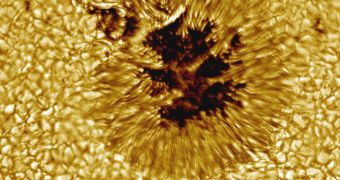Following the recent discovery of the Sun being at a record low in wind, another surprise came from its observers when they claimed that more than 200 days had passed without a spot on our star. It's been more than half a century since this last happened.
The previous record was registered in 1954, when the Sun had been “clean” for 241 days in a row. Our solar system's star has an 11-year cycle of highs and lows, and is now coming out of the most quiet of its stages. Still, even for this phase, it has been far too calm, showing little to no activity of its spot-generating magnetic fields. Today (Saturday, October 4, 2008) is the 278th day of this year and also the 207th spotless day for the Sun, as revealed by the National Oceanic and Atmospheric Administration’s Space Weather Prediction Center in Boulder, Colorado.
Since our data-gathering possibilities are still low, the collected information is far from being conclusive, so the scientists have no exact way of understanding why exactly this phenomenon occurs, and what its impact could be on global warming and climate changes. Their predictions are purely hypothetical at best. Similarly, based on scarce data and mathematical calculations, some estimate that it is possible that the Sun entered a low profile stage for an extended period of time.
From the middle of the 17th century to the beginning of the 18th, there was a period (the Maunder Minimum) during which the Sun showed the least known number of spots, a reduced activity that caused temperature decreases, leading to what is known as the Little Ice Age. By comparison, the current events “makes it look like we’re having a feast, not a famine,” explains David H. Hathaway, a solar physicist from NASA’s Marshall Space Flight Center in Huntsville, Alabama.
The spotlessness event comes right after the 50-year low registered in the solar wind activity. Although most scientists do not know the causes and implications of this combination of factors, some dare suggest that this unprecedented minimum in the Sun's activity may anticipate a ferocious maximum, which is about to begin. “I’m getting worried about that prediction now,” stated Hathaway. “Normally, big cycles start early, and by doing that, they cut short the previous cycle. This one hasn’t done that.” But it's extremely difficult to predict anything related to the Sun with high certitude. As Hathaway puts it, “There are a number of researchers who predict the next solar cycle. There are also a number of investment counselors who predict the future of the stock market.” We'll just have to wait and see - and hope for the best.

 14 DAY TRIAL //
14 DAY TRIAL //